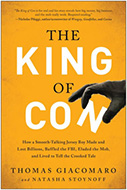King Of Con: How A Smooth-Talking Jersey Boy Made And Lost Billions, Baffled The Fbi, Eluded The Mob And Lived To Tell The Crooked Tale

Authors: Thomas Giacomaro and Natasha Stoynoff
Publisher: Dallas, TX: BenBella Books, 2018. 305p.
Reviewer: Frederick T. Martens | September 2020
Thomas Giacomaro and his co-author, Natasha Stoynoff, have written a tell-all memoir that is a treasure chest for criminologists and forensic psychologists who wish to understand what makes a con-man tick, and why their victims are often reluctant to report their victimization. Giacomaro surely is an audacious character. Incidentally, and in the interests of full disclosure, I was involved in an investigation of Giacomaro in 2001. While he was employed in the trucking industry as a so-called “roll-up specialist,” which served as his “legitimate” front, he was intimately engaged in a panoply of criminal ventures that he proudly admits to in this memoir.
Giacomaro’s skills were as renowned as was his reputation. He, like most con-men fit a classic profile: narcissistic, self-absorbed, amoral, charismatic, and photogenic. He had an uncanny ability to leverage his relationships with notable and prestigious individuals and institutions, and above all an uncontrollable desire to capture and manipulate his victims. Gaining the confidence and trust of his anticipated victims was his stock in trade. Among con-men, Giacomaro was the crème-dele-crème— a con-man at the top of his game.
For criminologists who study white collar crime, Thomas Giacomaro’s memoir will serve as a case study. There are ample material sources, court documents, and victims of Giacomaro to provide for a wide range of scholarly dissertations and books. One could, for example, learn about how informants can be mismanaged, or if interested in psychology, seeing what drives a person to engage in a life-time of serial deceit and reckless behavior, with an absence of remorse, or empathy, or any sense of guilt.
Having served a 14-year prison sentence for his crimes, Giacomaro here seamlessly transfers his verbal storytelling skills to the written word, producing a memoir that is candid, boldly accusatory, and profoundly revealing. Like most “tell and sell” memoirs, and perhaps more exaggerated when written by someone who has dedicated his life and career to deceiving others, Giacomaro’s accounts should be examined with a discerning and critical eye.
The book is filled with numerous stories of Giacomaro’s criminal exploits. For example, trusted with making payoffs to certain officials of the New Jersey Sports and Exposition Authority, local and state police departments, and customs officials on behalf of one of the most powerful trucking companies in North America—Maislan Trucking—Giacomaro reveled in his ability to ingratiate himself with people who were rich, famous, infamous, and powerful. Remarkably, Giacomaro, while at just the age of 19, contends that he was bringing on behalf of Maislan Trucking, briefcases filled with cash to Teamster’s President Jimmy Hoffa in Detroit. “I’d meet Hoffa in Detroit at a restaurant called Machus Red Fox…I’d hand the case to Hoffa… [He’d say] you’re doing great Tommy…you’re gonna be a big success. “Accepting payoffs from a 19-year-old untested “gopher” (his term) surely seems out of character for someone of Hoffa’s national and international stature.
Giacomaro’s propensity to leverage his obsessions with notorious and infamous villains is illustrative of a compelling need to promote his “street creds.” He even chooses to reflect on his paternal grandmother as being a “LaPlaca,” who he contends was related to the Genovese Mafia capo, Peter LaPlaca. Later, he writes that he “had the full protection of the Bonanno crime family while I was in prison, even though I was a Genovese [emphasis mine].” To my knowledge, Giacomaro was never a member of the Genovese Crime Family, nor did he seemingly choose to be. As he states, when he was approached by members of the Genovese Family to become 50-50 partners in his fledging trucking company: “No way [did]I want their protection and connections…I wanted to do things my way, as always…Lemme explain something to you so youse understand…I ain’t with you guys at all. You’re wit me” (p. 87). But as is often the case with most successful con-men, gilding the truth is necessary in order to burnish one’s credibility.
While Giacomaro engages in a combination of creative storytelling and truthful hyperbole in the book, let there be no doubt whatsoever, he was every bit as skilled, bold, and Machiavellian as he purports to be. As a case in point, a colleague and I travelled to Delaware to interview one of the many victims of Giacamaro’s investment schemes. The victim was terminally ill, dying of cancer. He had been defrauded of $30,000. Giacomaro refused to accept any of his phone calls. The victim finally told Giacomaro’s secretary that he was going to report Giacomaro to law enforcement authorities. Giacomaro immediately responded and arranged to meet with him in Wood-Ridge, New Jersey, at a renowned mob restaurant. Not only did he refuse to return the victim’s money, but Giacomaro convinced him to make another $20,000 investment, which he did!
This is only one of many examples of how adept Giacomaro was at separating people from their money—a skill that is seldom reported by the victim who fears public humiliation. As Giacomaro knew all too well, it is often easier to defraud the rich and more educated than those who count every penny.
One of the more intriguing aspects of this memoir is the insight it provides into the psychological forces that drove (and seemingly continue to drive) Giacomaro. His dysfunctional relationship with his father, who he contends, demeaned, devalued, and physically abused him, resulted in an unrelenting need to prove his self-worth. Attempting to reconcile his criminal behavior with his abusive childhood, Giacomaro underwent years of therapy, hoping to attain some degree of internal peace and ultimately, social respectability.
Perhaps predictably, the author says virtually nothing here about those who were the victims of his deceit and thievery; those that numbered in the hundreds, who lost their life savings and pensions and were denied their “golden years.” This of course, is consistent with a twisted sense of entitlement for one whose only goal in life was just to be the “king of the con.”
Frederick T. Martens is a retired Detective/Lieutenant in the New Jersey State Police who has investigated organized crime and public corruption in New Jersey. He was the President of the International Association for the Study of Organized Crime (IASOC).


